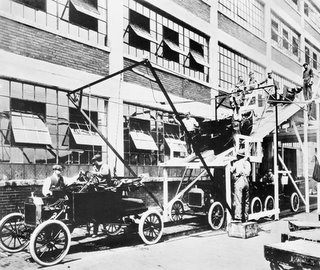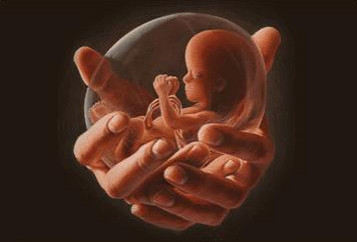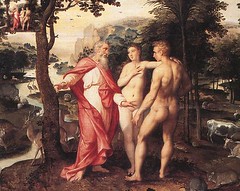1. The command of God to be "fruitful and multiply" (Gen. 1:28; 9:1,17; 35:11; 1 Tim. 5:10,14; AC XXIII, #5 & 8, Triglot p. 61; AP XXIII, #7-8, Trigl. p. 365-7; LC 6th Comm., # 207, Trigl., p. 639).
Genesis 1:28
Then God blessed them, and God said to them, “Be fruitful and multiply; fill the earth and subdue it; have dominion over the fish of the sea, over the birds of the air, and over every living thing that moves on the earth.”
Genesis 9:
1 So God blessed Noah and his sons, and said to them: “Be fruitful and multiply, and fill the earth.
17 And God said to Noah, “This is the sign of the covenant which I have established between Me and all flesh that is on the earth.”
Genesis 35:11
Also God said to him: “I am God Almighty. Be fruitful and multiply; a nation and a company of nations shall proceed from you, and kings shall come from your body.
1 Timothy 5:
10...well reported for good works: if she has brought up children, if she has lodged strangers, if she has washed the saints’ feet, if she has relieved the afflicted, if she has diligently followed every good work.
14 Therefore I desire that the younger widows marry, bear children, manage the house, give no opportunity to the adversary to speak reproachfully.
AC XXIII, #5 & 8, Triglot p. 61:
"God created man for procreation, Gen. 1:28 ... No man's law, no vow, can annul the commandment and ordinance of God."
AP XXIII, #7-8, Trigl. p. 365-7:
"First. Gen. 1:28 teaches that men were created to fruitful and that one sex in a proper way should desire the other. For we are speaking not of concupiscence, which is sin, but of that appetite which was to have been in nature in its integrity, which they call physical love. And this love of one sex for the other is truly a divine ordinance. But since this ordinance of God cannot be removed without an extraordinary work of God, it follows that the right to contract marriage cannot be removed by statutes or vows.
"The adversaries cavil at these arguments; they say that in the beginning the commandment was given to replenish the earth, but that now since the earth has been replenished, marriage is not commanded. See how wisely they judge! The nature of men is so forced by the Word of God that it is fruitful not only in the beginning of the creation, but as long as this nature of our bodies will exist; just as the earth becomes fruitful by the word, Gen. 1:11: Let the earth bring forth grass, yielding seed. Because of this ordinance the earth not only commenced in the beginning to bring forth plants, but the fields are clothed every year as long as this natural order will exist. Therefore, just as by human laws the nature of the earth cannot be changed, so, without a special work of God, the nature of a human being can be changed neither by vows nor by human law (that a woman should not desire a man, nor a man a woman)."
LC 6th Comm., # 207, Trigl., p. 639:
"Therefore, He also wishes us to honor it (matrimony), and to maintain and conduct it as a divine and blessed estate; because, in the first place, He has instituted it before all others, and therefore created man and woman separately (as is evident), not for lewdness, but that they should (legitimately) live together, be fruitful, beget children, and nourish and train them to the honor of God."
I will also add here an excerpt from some of Luther's comments regarding the divine ordinance "Be Fruitful and Multiply."
The following translation, the first into English, is based on the text published by Johann Grünenberg in Wittenberg, Uom Eelichen Leben, as reprinted with annotations in WA 10, 275–304.
Jesus
How I dread preaching on the estate of marriage! I am reluctant to do it because I am afraid if I once get really involved in the subject it will make a lot of work for me and for others. The shameful confusion wrought by the accursed papal law has occasioned so much distress, and the lax authority of both the spiritual and the temporal swords has given rise to so many dreadful abuses and false situations, that I would much prefer neither to look into the matter nor to hear of it. But timidity is no help in an emergency; I must proceed. I must try to instruct poor bewildered consciences, and take up the matter boldly. This sermon is divided into three parts.
Part One
In the first part we shall consider which persons may enter into marriage with one another. In order to proceed aright let us direct our attention to Genesis 1[:27], “So God created man … male and female he created them.” From this passage we may be assured that God divided mankind into two classes, namely, male and female, or a he and a she. This was so pleasing to him that he himself called it a good creation [Gen. 1:31]. Therefore, each one of us must have the kind of body God has created for us. I cannot make myself a woman, nor can you make yourself a man; we do not have that power. But we are exactly as he created us: I a man and you a woman. Moreover, he wills to have his excellent handiwork honored as his divine creation, and not despised. The man is not to despise or scoff at the woman or her body, nor the woman the man. But each should honor the other’s image and body as a divine and good creation that is weil-pleasing unto God himself.
In the second place, after God had made man and woman he blessed them and said to them, “Be fruitful and multiply” [Gen. 1:28]. From this passage we may be assured that man and woman should and must come together in order to multiply. Now this [ordinance] is just as inflexible as the first, and no more to be despised and made fun of than the other, since God gives it his blessing and does something over and above the act of creation. Hence, as it is not within my power not to be a man, so it is not my prerogative to be without a woman. Again, as it is not in your power not to be a woman, so it is not your prerogative to be without a man. For it is not a matter of free choice or decision but a natural and necessary thing, that whatever is a man must have a woman and whatever is a woman must have a man.
For this word which God speaks, 'Be fruitful and multiply,' is not a command. It is more than a command, namely, a divine ordinance which it is not our prerogative to hinder or ignore. Rather, it is just as necessary as the fact that I am a man , and more necessary than sleeping and waking, eating and drinking, and emptying the bowels and bladder. It is a nature and disposition just as innate as the organs involved in it. Therefore, just as God does not command anyone to be a man or a woman but created them the way they have to be, so he does not command them to multiply but creates them so that they have to multiply. And wherever men try to resist this, it remains irresistible nonetheless and goes its way through fornication, adultery, and secret sins, for this is a matter of nature and not of choice.
In the third place, from this ordinance of creation God has himself exempted three categories of men, saying in Matthew 19:12, 'There are eunuchs who have been so from birth, and there are eunuchs who have been made eunuchs by men, and there are eunuchs who have made themselves eunuchs for the sake of the kingdom of heaven.' Apart from these three groups, let no man presume to be without a spouse. And whoever does not fall within one of these three categories should not consider anything except the estate of marriage. Otherwise it simply impossible for you to remain righteous. For the Word of God which created you and said, 'Be fruitful and multiply,' abides and rules within you; you can by no means ignore it, or you will be bound to commit heinous sins without end.
[Luther's works, vol. 45, The Christian in Society II, The Estate of Marriage, pp. 15-18]
So, is there any doubt that only those with the gift of celibacy are exempt from thie divine ordinance to "be fruitful and multiply?"











